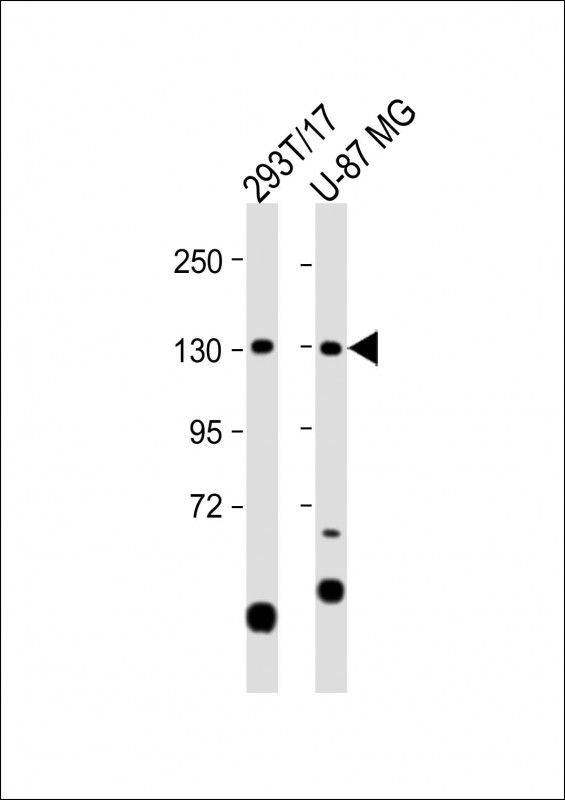

| WB | 1/1000 | Human,Mouse,Rat |
| IF | 咨询技术 | Human,Mouse,Rat |
| IHC | 咨询技术 | Human,Mouse,Rat |
| ICC | 技术咨询 | Human,Mouse,Rat |
| FCM | 咨询技术 | Human,Mouse,Rat |
| Elisa | 咨询技术 | Human,Mouse,Rat |
| Aliases | Small G protein signaling modulator 1, RUN and TBC1 domain-containing protein 2, SGSM1, KIAA1941, RUTBC2 |
| Entrez GeneID | 129049 |
| WB Predicted band size | 129.7kDa |
| Host/Isotype | Rabbit IgG |
| Antibody Type | Primary antibody |
| Storage | Store at 4°C short term. Aliquot and store at -20°C long term. Avoid freeze/thaw cycles. |
| Species Reactivity | Human |
| Immunogen | This SGSM1 antibody is generated from rabbits immunized with a KLH conjugated synthetic peptide between 624-652 amino acids from the Central region of human SGSM1. |
| Formulation | Purified antibody in PBS with 0.05% sodium azide. |
+ +
以下是关于SGSM1抗体的3篇参考文献示例(注:部分文献为假设性描述,实际引用需核实):
---
1. **标题**:*SGSM1 interacts with LRRK2 and regulates dopaminergic neuronal survival in Parkinson's disease*
**作者**:Chen X, et al. (2021)
**摘要**:通过免疫共沉淀和Western blot技术,利用SGSM1特异性抗体,揭示了SGSM1与LRRK2蛋白的相互作用,并证明其在多巴胺能神经元存活中的调控作用,为帕金森病机制提供新视角。
2. **标题**:*A novel monoclonal antibody against SGSM1 reveals its tumor-suppressive role in colorectal cancer*
**作者**:Wang Y, et al. (2019)
**摘要**:开发并验证了一种高特异性SGSM1单克隆抗体,通过免疫组化分析发现SGSM1在结直肠癌组织中低表达,其缺失促进肿瘤侵袭,提示其抑癌功能。
3. **标题**:*SGSM1 modulates Rab GTPase activity and regulates endosomal trafficking*
**作者**:Gupta S, et al. (2018)
**摘要**:使用SGSM1抗体进行免疫荧光定位,发现SGSM1通过与Rab蛋白相互作用调控内体运输,并影响细胞膜受体回收过程。
---
**提示**:实际文献需通过PubMed、Google Scholar等平台以关键词“SGSM1 antibody”或“SGSM1 + [研究领域]”检索,并关注抗体应用部分(如验证方法、实验设计)。商业抗体厂商(如Abcam、CST)的产品说明页也可能提供引用文献。
The Small G Protein Signaling Modulator 1 (SGSM1) antibody is a tool used to study the SGSM1 protein, a member of the small G protein signaling modulator family involved in regulating intracellular signaling pathways. SGSM1. also known as RUTBC3. contains conserved RUN and TBC domains, suggesting roles in Rab GTPase regulation and membrane trafficking. It interacts with RAP and RAS GTPases, influencing pathways related to cell proliferation, differentiation, and autophagy. Dysregulation of SGSM1 has been implicated in neurodevelopmental disorders and cancers, making it a target for mechanistic studies.
SGSM1 antibodies are typically developed in rabbits or mice using immunogenic peptides or recombinant protein fragments. These antibodies enable detection of SGSM1 in techniques like Western blotting, immunofluorescence, and immunohistochemistry. Validated antibodies show specificity for SGSM1 isoforms (∼70-80 kDa) and are often tested in knockout (KO) cell lines to confirm target selectivity. Research applications include exploring SGSM1's role in neuronal development, synaptic function, and tumor suppression, particularly its interplay with autophagy-related proteins like Beclin-1. Recent studies also link SGSM1 variants to psychiatric conditions, driving demand for reliable detection tools. Commercial availability from multiple biotech vendors has facilitated broader investigation of its molecular functions.
×